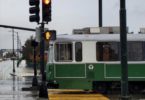By Melissa Ellin
Boston University Statehouse Program
Fixing the MBTA could cost $300 million, and that’s not accounting for nearly 650 bridges requiring repairs, or for Massachusetts’ regional transit authorities in need of improvement. For its growing infrastructure issues, the state is asking voters to decide whether additional funding should come from taxes.
Ballot Question 1 this general election proposes an amendment to the state’s Constitution so that revenues from a 4% surtax on those making more than $1 million annually would go toward select education purposes and “the repair and maintenance of roads, bridges, and public transportation.” It also leaves the Legislature in charge of determining allocation.
This would provide a permanent well of funds for education and transportation, which is why Yes on 1 Communication Director Andrew Farnitano said the language was left intentionally vague. He added that it provides “flexibility” to avoid cornering legislators into spending patterns.
“You won’t see an itemized list of specific projects,” Farnitano said. “That’s the legislators’ prerogative to decide, ‘This much money should go to replacing these specific bridges and this much money should go to hiring more bus drivers for the MBTA.’”
No on 1 spokesperson Dan Cence said increased funding for transportation and education is “noble” and the state should pursue it, but Question 1 is not the answer.
“Question 1 would increase taxes at a time when we have a huge surplus in Massachusetts, at a time when small businesses are struggling to rebound from COVID, at a time when the housing market is skyrocketing, and we put an undue burden on retirees, on small business owners on farmers,” Cence said. “It’s really more of a middle-class tax hike than anyone imagined.”
While the state currently has surplus funds, Rep. James O’Day, D-West Boylston and bill sponsor, said the amendment will help decrease any odds of Massachusetts running out of money for these important projects, which are heavily supported by COVID relief aid and other federal monies currently.
“That is essentially one-time funding,” O’Day said of the current surplus. “I’m certainly hopeful that we’re not going to be looking at economic downturns like we were in 2008, 2009 but if there were, we would at least have a little bit of an additional cushion from the millionaires and the billionaires here in the Commonwealth.”
At the same time, Sen. Brendan Crighton, D-Lynn, Senate chair of the Legislature’s Transportation Committee, said lawmakers need to be mindful of the amount of money required to fix the state’s infrastructure issues.
“We need to continue to have a conversation about how we fund our existing system and also the system that we believe our ridership for the people of Massachusetts deserve,” said Crighton, adding that while he “100%” supports the amendment, the revenue from the surtax cannot fund every project.
When talking about how to spend these funds, O’Day said it’s important to remember their scope extends beyond the MBTA.
The tax, he added, could allow for financial investments in the state’s often-forgotten 15 regional transit authorities. In his district, O’Day said Worcester’s RTA is testing out free riding capabilities, but without additional finances, the program will not last.
As is, RTA Advocates Coalition Co-Chair Elise Mason said RTAs have to request funding annually from Legislature for dedicated purposes, which is a barrier to improvement.
“An amendment to the Constitution gives us another access point to help bulk up what the RTAs have to ask for every year in order to operate their services,” said Mason, also the community engagement manager for Transportation for Massachusetts.
Prioritizing funds at this time is virtually impossible, said T4M Senior Advisor Pete Wilson. Before the state can even consider how to spend money, it needs to decide which communities and systems require it.
“You can look at it through the holistic approach of ‘How do we get from one state to the other?’” he said. “You can also look at who needs the services most and who have been the most disproportionately impacted by transportation decisions over the last 50 to 100 years.”
O’Day said it’s hard to tell how much money might be at the Legislature’s disposal, but if the amendment is passed and once lawmakers know, constituents will inform decision-making.
“We do not live in a vacuum, we do not work in a vacuum,” O’Day said. “We hear from our constituents, we work with our constituents.
Legislators, Yes on 1’s Farnitano said, are already making plans for how this funding should be spent. Farnitano, also part of Raise Up Massachusetts, a coalition of community, faith and labor organizations that has worked since 2015 to get this amendment on the ballot, said if voters approve the amendment the group plans to hold the government accountable.
“We’ve stuck together and we are committed to ensuring that the Legislature lives up to their commitment and spends the money as they are constitutionally required to,” Farnitano said.




